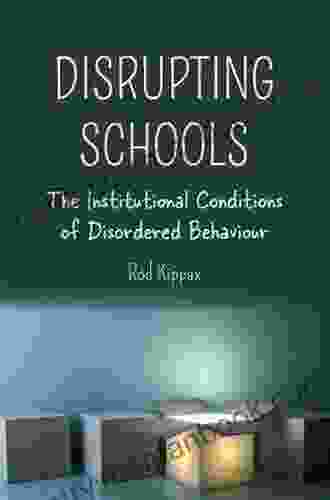The Institutional Conditions Of Disordered Behaviour: Disability Studies In The Social Sciences

The concept of "disorder" is a social construct that has been used to label and exclude people who are different or who do not conform to social norms. This is especially true in the case of mental illness, which has often been seen as a sign of weakness or moral failing. As a result, people with mental illness have often been subjected to discrimination and abuse.
4.4 out of 5
| Language | : | English |
| File size | : | 1984 KB |
| Text-to-Speech | : | Enabled |
| Screen Reader | : | Supported |
| Enhanced typesetting | : | Enabled |
| Word Wise | : | Enabled |
| Print length | : | 218 pages |
In recent years, there has been a growing movement to challenge the traditional view of mental illness. Disability studies scholars have argued that the concept of "disorder" is socially constructed and that it is often used to label and exclude people who are different or who do not conform to social norms. These scholars have also argued that the institutional conditions in which people with mental illness are often confined, such as hospitals and prisons, can contribute to the production and maintenance of disordered behavior.
This article will explore the institutional conditions of disordered behavior, focusing on the role of social and cultural factors in shaping the way that people with mental illness are perceived and treated. The article will also examine the role of institutions, such as hospitals and prisons, in the production and maintenance of disordered behavior.
The Social Construction Of Disordered Behaviour
The concept of "disorder" is a social construct that is constantly being shaped and reshaped by social and cultural forces. In the case of mental illness, the concept of "disorder" has been used to label and exclude people who are different or who do not conform to social norms. This is especially true in the case of people with mental illness who are also members of marginalized groups, such as people of color, people with disabilities, and LGBTQ people.
The social construction of disordered behavior is a complex process that involves a number of different factors, including:
- The way that mental illness is defined and diagnosed. The definition of mental illness is constantly changing, and it is often based on subjective criteria. This can lead to people being diagnosed with mental illness even though they do not meet the criteria for diagnosis.
- The way that mental illness is treated. The treatment of mental illness often involves the use of drugs and other interventions that can have harmful side effects. This can lead to people becoming dependent on treatment and to them losing their ability to live independently.
- The way that mental illness is perceived by society. Mental illness is often seen as a sign of weakness or moral failing. This can lead to people with mental illness being stigmatized and discriminated against.
The social construction of disordered behavior has a number of negative consequences for people with mental illness. These consequences include:
- Discrimination. People with mental illness are often discriminated against in employment, housing, and education. They may also be denied access to healthcare and other essential services.
- Stigma. Mental illness is often stigmatized, and this can lead to people with mental illness being isolated and excluded from society.
- Violence. People with mental illness are more likely to be victims of violence than people without mental illness. This is due to a number of factors, including the stigma associated with mental illness and the fact that people with mental illness are often vulnerable and isolated.
The Role Of Institutions In The Production And Maintenance Of Disordered Behaviour
Institutions, such as hospitals and prisons, play a significant role in the production and maintenance of disordered behavior. This is due to a number of factors, including:
- The way that institutions are structured. Institutions are often structured in a way that is dehumanizing and disempowering. This can lead to people feeling isolated and alone, and it can make it difficult for them to get the help that they need.
- The way that institutions are staffed. Institutions are often staffed by people who have little or no training in working with people with mental illness. This can lead to people with mental illness being treated in a way that is disrespectful and harmful.
- The way that institutions are funded. Institutions are often funded in a way that is inadequate to meet the needs of the people who live there. This can lead to people with mental illness not getting the treatment and support that they need.
The role of institutions in the production and maintenance of disordered behavior is a complex issue. However, it is clear that institutions can play a significant role in the lives of people with mental illness, and that they can contribute to the production and maintenance of disordered behavior.
The institutional conditions of disordered behavior are a complex and multifaceted issue. These conditions include the way that mental illness is defined and diagnosed, the way that it is treated, and the way that it is perceived by society. Institutions, such as hospitals and prisons, also play a significant role in the production and maintenance of disordered behavior.
It is important to understand the institutional conditions of disordered behavior in order to develop effective interventions to address this issue. These interventions should focus on changing the way that mental illness is defined and diagnosed, the way that it is treated, and the way that it is perceived by society. They should also focus on changing the way that institutions are structured, staffed, and funded.
By working to change the institutional conditions of disordered behavior, we can create a more just and equitable society for people with mental illness.
4.4 out of 5
| Language | : | English |
| File size | : | 1984 KB |
| Text-to-Speech | : | Enabled |
| Screen Reader | : | Supported |
| Enhanced typesetting | : | Enabled |
| Word Wise | : | Enabled |
| Print length | : | 218 pages |
Do you want to contribute by writing guest posts on this blog?
Please contact us and send us a resume of previous articles that you have written.
 Top Book
Top Book Novel
Novel Fiction
Fiction Nonfiction
Nonfiction Literature
Literature Paperback
Paperback Hardcover
Hardcover E-book
E-book Audiobook
Audiobook Bestseller
Bestseller Classic
Classic Mystery
Mystery Thriller
Thriller Romance
Romance Fantasy
Fantasy Science Fiction
Science Fiction Biography
Biography Memoir
Memoir Autobiography
Autobiography Poetry
Poetry Drama
Drama Historical Fiction
Historical Fiction Self-help
Self-help Young Adult
Young Adult Childrens Books
Childrens Books Graphic Novel
Graphic Novel Anthology
Anthology Series
Series Encyclopedia
Encyclopedia Reference
Reference Guidebook
Guidebook Textbook
Textbook Workbook
Workbook Journal
Journal Diary
Diary Manuscript
Manuscript Folio
Folio Pulp Fiction
Pulp Fiction Short Stories
Short Stories Fairy Tales
Fairy Tales Fables
Fables Mythology
Mythology Philosophy
Philosophy Religion
Religion Spirituality
Spirituality Essays
Essays Critique
Critique Commentary
Commentary Glossary
Glossary Bibliography
Bibliography Index
Index Table of Contents
Table of Contents Preface
Preface Introduction
Introduction Foreword
Foreword Afterword
Afterword Appendices
Appendices Annotations
Annotations Footnotes
Footnotes Epilogue
Epilogue Prologue
Prologue Tony Roberts
Tony Roberts Anabel Bright
Anabel Bright Sanjida O Connell
Sanjida O Connell Anita Shreve
Anita Shreve James Patterson
James Patterson Tina Blythe
Tina Blythe Julia Adamo
Julia Adamo Gopal Parajuli
Gopal Parajuli Gabrielle Bernstein
Gabrielle Bernstein Frank J Lechner
Frank J Lechner Rk Munin
Rk Munin Darryl Cunningham
Darryl Cunningham Rita Duponty
Rita Duponty Ola Rotimi
Ola Rotimi Courtney Epps
Courtney Epps Jennifer Lee
Jennifer Lee Geri Lobiondo Wood
Geri Lobiondo Wood Kindle Comixology
Kindle Comixology James Hogg
James Hogg Wendy Mackenzie Pease
Wendy Mackenzie Pease
Light bulbAdvertise smarter! Our strategic ad space ensures maximum exposure. Reserve your spot today!

 Dustin RichardsonPoems From the Attic: Uncovering the Hidden Treasures of Morgan Nikola Wren
Dustin RichardsonPoems From the Attic: Uncovering the Hidden Treasures of Morgan Nikola Wren Jimmy ButlerFollow ·9.8k
Jimmy ButlerFollow ·9.8k Branson CarterFollow ·8.8k
Branson CarterFollow ·8.8k Dawson ReedFollow ·13.7k
Dawson ReedFollow ·13.7k Aron CoxFollow ·19.8k
Aron CoxFollow ·19.8k Corey HayesFollow ·12.5k
Corey HayesFollow ·12.5k Harry HayesFollow ·5.2k
Harry HayesFollow ·5.2k Emilio CoxFollow ·14.8k
Emilio CoxFollow ·14.8k Ricky BellFollow ·5.7k
Ricky BellFollow ·5.7k

 Patrick Hayes
Patrick HayesDeath on Stage: Euphemia Martins Mystery 16
Synopsis In the...

 Benji Powell
Benji Powell1001 Best Baking Recipes Of All Time
Baking is a fun and...

 Terry Bell
Terry BellDestined War of the Covens: A Supernatural Saga of Power,...
Welcome to the...

 Mark Twain
Mark TwainBitcoin For Mere Mortals: A Comprehensive Guide for...
Bitcoin is a...

 Dennis Hayes
Dennis HayesThe Best Budget Gaming PC 2024: Build the Ultimate Gaming...
Are you looking to build the best budget...
4.4 out of 5
| Language | : | English |
| File size | : | 1984 KB |
| Text-to-Speech | : | Enabled |
| Screen Reader | : | Supported |
| Enhanced typesetting | : | Enabled |
| Word Wise | : | Enabled |
| Print length | : | 218 pages |











